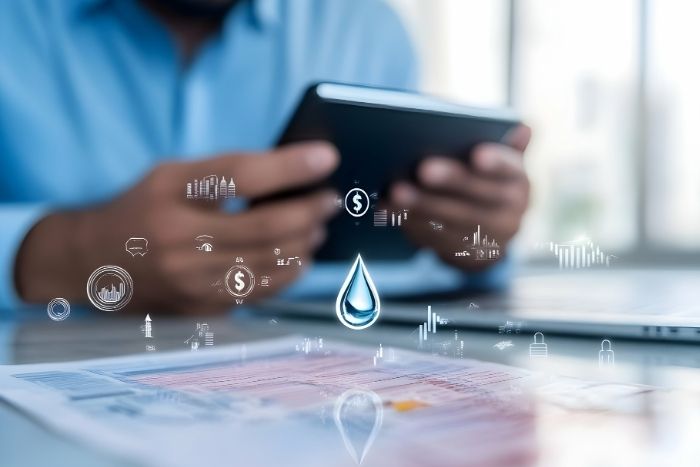Water agency fees are used to finance actions to preserve water and aquatic environments.
A reform of these water agency fees came into force on January1, 2025. What are the changes brought about by this reform and their impact on companies?
Abolition of the fee for modernization of collection networks
This fee will be abolished on January1, 2025. People connected to a collective wastewater treatment system and subject to the non-domestic water pollution charge were liable.
Creation of 3 new fees
Creation of a drinking water consumption charge
This fee applies to people who have subscribed to the drinking water service (except those with a specific meter).
The fee is calculated by multiplying the base by the tariff. The tax base is the volume of water billed to the subscriber. Each water agency sets the rate, up to a maximum of €1 perm3.
Starting in 2025, the fee will be billed by the department responsible for water billing, and will appear on the water bill under "Public bodies".
Creation of drinking water network performance and wastewater system performance charges
Municipalities or their public bodies responsible for drinking water supply and wastewater treatment are subject to this fee.
From 2025 onwards, they will be passed on to users in the form of a surcharge on the price per cubic metre of water sold or treated, and will appear on the bill under the heading "Public bodies".
Change in non-domestic water pollution charges
Industrial companies not connected to the public wastewater collection network (i.e. discharging into the natural environment) are now subject to these regulations if they exceed the parameter thresholds (set out in Article L. 213-10-2 of the Environment Code, which have not changed).
Industrial companies discharging only into a collective sewerage system are no longer concerned. Note that in 2025, they will have to pay the fee for 2024.
As a result, SRR (regular discharge monitoring) is now mandatory only for industrial companies not connected to the public wastewater collection network.
In addition, the basis for determining the royalty is now increased by 40% when :
- or the theoretical level of pollution linked to the activity is higher than the threshold and a RRS is not set up;
- or the SRR is not approved.
Change in water abstraction charges
A minimum rate has been introduced for calculating this fee. In addition, the maximum rates have been increased to take account of inflammation. The fee rate is thus set by each water agency, by type of use, within the limits of the minimum and maximum rates.
Note: this fee still applies to anyone drawing on water resources (e.g. boreholes, wells, etc.) for volumes in excess of 10,000m3/year(or 7,000m3/year for sectors in water distribution zones).
Changes have also been made to the management of water meters (in the event of breakdowns, non-compliant diagnostics, etc.).
Conclusion
One of the aims of this reform is to "gradually rebalance the origin of contributions, so as to reduce the burden of water taxation on households". Companies, and in particular industrial firms, will therefore be directly affected by this reform, and may see an increase in the payment of their water charges, whether they pay them directly to the water agency or on their water bills.
Additional resources: Loire Bretagne Water Agency industrial webinar - https://aides-redevances.eau-loire-bretagne.fr/


.svg)



